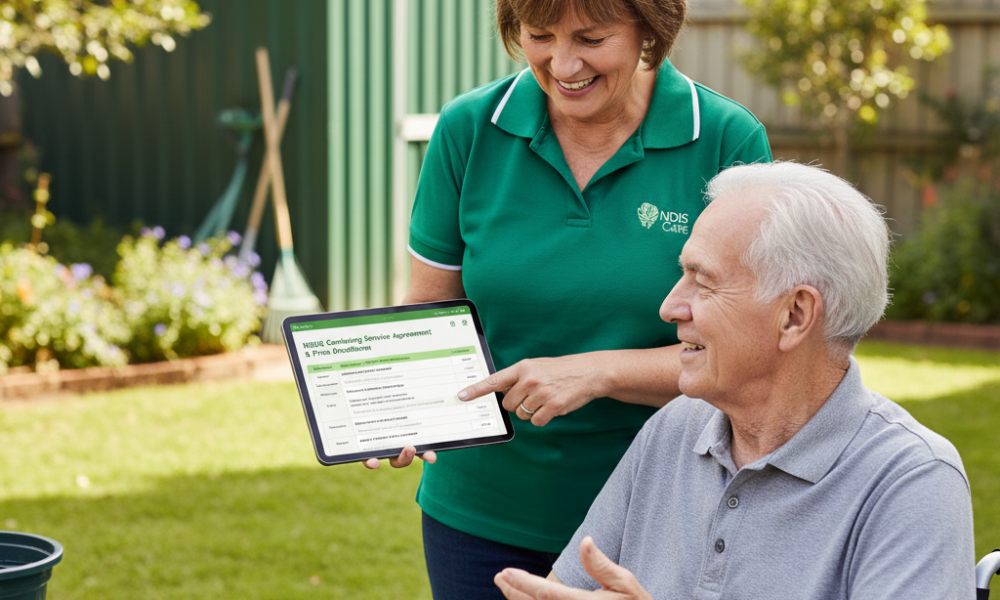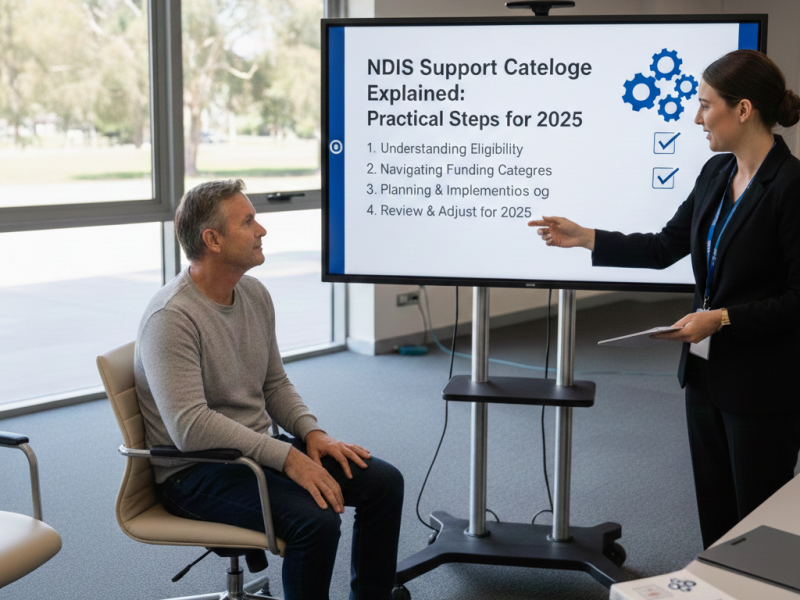Maintaining a clean, tidy, and safe living environment is essential for NDIS Participants, especially those facing physical or cognitive challenges that make household tasks difficult. The National Disability Insurance Scheme (NDIS) acknowledges this important need by providing eligible Participants with funding for House and Garden Maintenance. This support assists Participants in living safely and independently at home while ensuring their surroundings remain well-maintained and hazard-free.
Accessing NDIS Funding for Household Tasks
Home and Garden Maintenance funded by the NDIS is categorised under Core Supports, specifically within the Assistance with Daily Life support category. Household tasks enable Participants to maintain their home environment, including undertaking essential household tasks that the Participant is not able to undertake, with the aim to help Participants maintain a safe, clean, and accessible living environment. Tasks such as cleaning, laundry, washing dishes, and basic garden upkeep can be funded if they are deemed “reasonable and necessary” and directly address the Participant’s disability-related support needs.
It is important to note that the NDIS does not cover costs for services provided to other household members or general daily living expenses. Funded tasks must directly relate to the Participant’s disability, helping them to enhance their independence, safety, and overall well-being.
Want to Attract More NDIS Clients?
Get expert advice on how to market your services, connect with clients, and grow your practice.
NDIS Price Guide for Gardening Services
NDIS-funded gardening services are typically grouped under general household assistance and are charged on an hourly basis. As outlined in the NDIS Pricing Arrangements and Price Limits 2024, the standard hourly rate for NDIS gardening or yard maintenance ranges from approximately $52.85 to $60.00 in metropolitan and regional areas.
The actual cost is based on:
- The service location (Standard, Remote, or Very Remote)
- Whether the service occurs during standard business hours or after hours
- The Provider type (Registered or Unregistered, Self-managed or Plan-managed)
For Participants living in Remote or Very Remote locations, the NDIS permits price loadings of 25% and 50% respectively, to cover the additional costs associated with travel and service access.
Gardening and yard maintenance supports are billed in hourly increments, and Providers are expected to supply itemised receipts outlining the work completed. To avoid unexpected expenses, Participants should always request a written Service Agreement or a detailed quote before the service begins.
Self-managed Participants have more flexibility and may choose to hire non-NDIS Registered gardeners, provided the services meet NDIS standards and correct invoicing is supplied. Plan-managed Participants, on the other hand, must only engage Providers approved by their Plan Manager.
Household Tasks Rates 2025-26
NDIS prices are regulated by the NDIS Pricing Arrangements and Price Limits, which set out the maximum hourly rates that Registered Providers can charge for supports and services. General cleaning, gardening and basic domestic maintenance activities fall under “Assistance with Household Tasks”.
The current NDIS Pricing Arrangements and Price Limits has set the rates for house cleaning services (01_020_0120_1_1 ) to range from $58.03 to $87.05 per hour. Rates for gardening services (01_019_0120_1_1) range from $56.98 to $85.47 per hour. Actual prices depend on location and whether services are provided during standard or non-standard hours.
What Does an NDIS Registered Gardener Do?
An NDIS Registered Gardener provides services that help Participants maintain their outdoor spaces safely and accessibility. These gardening services go beyond simple aesthetics; they are essential in reducing hazards, preventing falls, and enabling outdoor mobility for Participants living with disabilities.
NDIS gardening services may include:
- Lawn mowing and edging
- Trimming hedges and pruning trees
- Weed control and removal
- Clearing leaves, debris, and green waste
- Planting and basic landscaping to enhance accessibility
- Removing rubbish that presents a safety hazard
- Maintaining domestic gardens to ensure safe outdoor environments
In addition to performing hands-on tasks, NDIS Registered Gardeners often assess outdoor areas for potential hazards such as overhanging branches, slippery surfaces, or uneven paths. These safety checks ensure that outdoor spaces remain secure and accessible for daily use by Participants.
All NDIS Registered Gardeners are required to meet the standards set out in the NDIS Practice Standards. This includes providing reliable, high-quality, and disability-aware support, maintaining appropriate records, and issuing clear, itemised invoices that meet NDIS claiming requirements.
Participant Eligibility for NDIS Gardening Services
To access House and Garden Maintenance services funded by the NDIS, Participants need to demonstrate that their disability prevents them from safely or independently managing essential tasks around their home or garden. These services are classified under Core Supports within the Assistance with Daily Life category. The NDIS provides funding specifically to support health, safety, and accessibility needs—not simply to enhance appearance.
Eligibility typically depends on:
- The Participant’s functional limitations, particularly affecting mobility, strength, or cognitive functioning.
- Having an independent living or safe-living goal explicitly stated in their NDIS Plan.
- A clear and direct link between requested maintenance services and the Participant’s disability-related needs.
Referrals Start With Reputation – We’ll Help You Build Both
From networking tips to service refinement, we guide NDIS providers toward lasting impact.
It’s important for Participants and Providers to have relevant supporting documents available when preparing or reviewing the NDIS Plan, such as Occupational Therapist assessments, Physiotherapist reports, or GP referrals. These documents should clearly highlight why assistance with home or garden maintenance tasks is necessary for the Participant’s safety, accessibility, or well-being.
For example, if mobility around the home is impeded due to clutter or debris creating trip hazards, pathways outside are overgrown restricting safe passage, or the Participant risks injury when carrying out cleaning or gardening tasks, these scenarios would justify inclusion of funding for assistance with household tasks in their NDIS Plan.
Ultimately, all gardening-related supports must meet the NDIS funding criteria of being reasonable and necessary and must be directly tied to the Participant’s disability-related needs and goals.
FAQs
1. Which House and Garden Maintenance services can be funded by the NDIS?
The NDIS may fund House and Garden Maintenance services aimed at ensuring safety, accessibility, and independence for Participants. Eligible tasks include general cleaning, laundry, mowing lawns, trimming hedges, pruning trees, weed removal, clearing pathways, disposing of waste, and minor landscaping to improve accessibility. These services must directly relate to the Participant’s disability support needs, such as clearing pathways for wheelchair access or preventing injury from household or garden hazards. Services solely for cosmetic purposes are not eligible.
2. How do I know if a Participant is eligible for NDIS-funded House and Garden Maintenance services?
Participants are typically eligible if their disability prevents them from safely or independently performing home or garden maintenance tasks. To include these supports in an NDIS Plan, Participants must clearly demonstrate the link between their disability needs and the requested services. This usually involves discussing the need during planning or review meetings and providing supporting documentation, such as Occupational Therapist reports or recommendations from health professionals.
3. How much does the NDIS pay for House and Garden Maintenance services?
House and Garden Maintenance services are funded under the Participant’s Core Supports budget within the Assistance with Daily Life category. According to the current NDIS Pricing Arrangements and Price Limits, the hourly rates for house cleaning services (support item 01_020_0120_1_1) range from $58.03 to $87.05. For gardening services (support item 01_019_0120_1_1), the hourly rates range from $56.98 to $85.47. Actual rates charged depend on the Participant’s location and whether services are delivered during standard or non-standard hours. Higher rates typically apply in remote or very remote areas and for after-hours support.
4. How can a Participant include House and Garden Maintenance services in their NDIS Plan?
To include House and Garden Maintenance services, Participants should discuss their specific support needs during their NDIS planning or plan review meeting. It is important to clearly explain how these maintenance tasks directly relate to the Participant’s disability and impact their ability to maintain a safe living environment. Providing supporting documentation from Occupational Therapists, other allied health professionals, or doctors significantly strengthens the request. Once approved, these services will be allocated within the Participant’s Core Supports budget.


